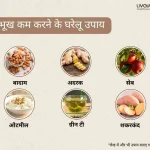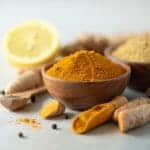
Cough – A natural bodily reflex
Did you know that coughing is the most natural and healthy function of your body? But only if it happens occasionally.
Coughing is a spontaneous reflex of the body to help expel irritants like dust and phlegm out of your lungs. If you are coughing very occasionally, chances are, it may clear up without any treatment.
Acute cough is often followed by an upper respiratory tract infection. It may be initially disruptive but rarely requires any medical intervention. 1 Chronic cough, however, is a key symptom of many important respiratory tract disorders.
In this article, we will discover more about the management of acute cough through traditional Ayurvedic home remedies like honey, turmeric, tulsi, and more, easily accessible in your kitchen.
But first, let’s talk about what causes acute cough.
Read t=our related guide on – Best Fruits to Eat and Avoid during Cough
Causes of cough
The causes of cough are classified based on the duration of the cough. Acute cough typically lasts less than 3 weeks. 2
The most common causes of acute cough are: 2
- Viral upper respiratory tract infections, also known as the common cold
- Acute bronchitis
- Inhalation of irritants
- Allergies
- Asthma
While cough is perceived as just a symptom in modern science, Ayurveda considers it as a disease. Acharya Charaka defines cough or Kasa as the release of obstructed Vayu (air) with the production of abnormal sound. This may be dry (without secretions) or productive (with secretions). 3
Acute cough may persist due to the inflammation of the upper respiratory infections or irritation caused by mucus. 16
How to get rid of a cough – Ayurvedic home remedies
The age-old holistic healing tradition of Ayurveda provides comprehensive relief from cough through readily available natural remedies found in your own home. You may consider the following home remedies for addressing acute cough:
1. Turmeric
Now who hasn’t grown up drinking the ever-effective haldi doodh when suffering from cough? The main component in turmeric, called curcumin, has anti-inflammatory properties – most therapeutic and effective for dry coughs.7
How to consume: 6 7
- Consume a glass of hot milk mixed with half a teaspoon of turmeric powder
- Another way to consume turmeric powder is to mix it with water and honey
- Alternatively, take 1 teaspoon each of turmeric powder and carom seeds, add to water, and boil until it reduces to half. Add some honey and drink until the condition improves
2. Honey
A time-honored home remedy for sore throat is honey or Madhu. With its strong anti-inflammatory and antioxidant properties, it is a natural antitussive. 6 8
How to consume: 5 6
- In case of dry cough and chest pain caused due to recurrent coughing, consume hot milk with honey daily before bed.
- Alternatively, a simple teaspoon of honey with a pinch of clove or Laung powder should do the trick.
3. Ginger
A rhizome with antioxidant and anti-inflammatory properties, ginger has been used in Ayurvedic medicine since time immemorial. 4 Ginger is considered a Vata and Kapha sedative and is typically administered for cough caused by common flu or cold. Ayurveda considers ginger to be a Kasahara, which means it is effective in reducing cough. 4
How to consume: 5
- Take 2-5 gm of dry ginger powder (Sunthi/Sonth) with jaggery thrice a day in divided doses.
- Consume a 10 ml decoction of a ginger piece every morning.
4. Tulsi
Tulsi is a revered Ayurvedic plant known for its high medicinal and therapeutic value. Referred to as “The Queen Of Herbs” in Ayurveda, tulsi is an essential ingredient in most Ayurvedic cough syrups. 9 10 Tulsi tastes hot and bitter and is known to normalize Kapha and Vata by penetrating dry tissue secretions. 9
- Typically used to relieve cough caused by cold, a hot decoction of tulsi leaves proves to be most effective – 5-10 ml tulsi leaves’ juice with honey thrice a day.
- The magical combination of tulsi and ginger is another alternative to fix cough. Simply crush 10 tulsi leaves, mix them with the juice extracted from a small piece of ginger, add honey, and consume a teaspoon thrice a day.
5. Cinnamon
The aromatic spice cinnamon or Dalchini is an ancient remedy for treating cough. The main part of its tree which is used as a spice is the bark. 11
Its anti-inflammatory, antioxidant, and anti-allergic properties deem it suitable for curing common colds and coughs. 12
- Take 2 gm powder of the bark, mix it with water, and consume.
- Or, add a pinch of cinnamon powder to a teaspoon of honey and consume it thrice a day to relieve cough.
6. Black Pepper
Black pepper or Kalimirch is a godsend when it comes to treating a cough. Black pepper mixed with honey has been used as a tonic to resolve cough issues for a long time in Indian households. 13
Black pepper is a natural decongestant and helps relieve productive or wet cough by thinning down the mucus for easy breathing. 13
- Make a black pepper tonic by mixing a teaspoon each of black pepper powder and turmeric powder and boiling it in half a cup of water. Add a tablespoon of honey and consume until the condition improves. The addition of cinnamon sticks is optional.
- Or you can consume it by adding 1g of black pepper seeds powder with ghee and honey twice daily.
7. Clove
Laung or clove has been traditionally used as a cough remedy owing to its antimicrobial and antioxidant properties. 14
How to consume: 5
- For both dry and productive coughs, prepare a 20 ml warm decoction with 1 gm clove. Consume 3-4 times daily.
- Or, frequently chew on it.
8. Garlic
Garlic is the most valued herb for not only its flavor but also its therapeutic properties that resolve many ailments, owing to its anti-inflammatory, antibacterial, and antioxidant properties. 15 The chemical constituent called allicin in garlic is popularly known to cure the common cold and cough. 6
How to consume: 5
- Crush the bulb and boil it in water, finally consume this with sugar
What’s more?
The best part about home remedies is that there is always an alternative. If the above-mentioned remedies are not available to you, you can always choose other options 6 like almonds, pineapples, grapes, fennel, cardamom, eucalyptus oil, licorice, and more. Since our bodies are differently designed, their individual reaction to the various remedies varies. Thus paving the way for a choice when looking for the most effective cure.
FAQs
1. How long does an acute cough last? How do I know if it is chronic in nature?
The classification of a cough is based primarily on its duration. A cough lasting less than 3 weeks is labeled as acute, while one persisting for 3 to 8 weeks is termed subacute. A cough lasting more than 8 weeks is categorized as chronic.
2. What is the best home remedy for curing cough?
There is no one particular remedy that can be designated to be the best. Our bodies are designed differently and react to medicine at a different pace. Therefore, choosing a home remedy that is easily accessible and beneficial in the past is the most effective.
3. Are there more home remedies for curing a cough?
Yes. Apart from the traditional remedies like honey, turmeric, ginger, cardamom, etc., one can even opt for other options like 6 almonds, pineapples, grapes, fennel, cardamom, eucalyptus oil, licorice, and more.
4. Should I opt for home remedies or a doctor’s prescription while curing cough?
While Ayurvedic remedies do not have any side effects, it is always advised to consult a medical professional before making any dietary modifications, typically when a remedy is to be administered more frequently. Further, if your coughing becomes too extensive and continues to trouble you beyond a certain duration (more than 8 weeks), it is recommended to seek medical attention immediately.
Conclusion
Although coughing is a natural bodily reflex, it is crucial to monitor its frequency and severity. This ensures the timely application of effective remedies or, when needed, seeking medical attention. Ayurveda, a comprehensive medical system, offers home remedies that have stood the test of time and proven effective in treating various ailments, including acute cough. Common remedies like turmeric milk, honey, and ginger are familiar to many of us from childhood. Nevertheless, it’s essential to grasp the potential impact of these remedies and recognize the importance of consulting healthcare professionals when necessary.
Disclaimer
This article is written from a health and wellness perspective and is not medical advice. Kindly seek the help of a certified medical practitioner before initiating any treatment or dietary modification.
References
- Recommendations for the management of cough in adults
- Cough
- AN OUTLOOK OF COUGH IN CONTEXT OF KASA ROGA IN AYURVEDA
- ZINGIBER OFFICINALE (GINGER): A REVIEW BASED UPON ITS AYURVEDIC AND MODERN THERAPEUTIC PROPERTIES
- Ayurvedic home remedies
- Cough Suppressant Herbal Drugs: A Review
- Turmeric: A Herbal and Traditional Medicine
- Health Benefits of Honey
- Tulsi – Ocimum sanctum: A herb for all reasons
- Tulsi: A holy plant with high medicinal and therapeutic value
- Cinnamon (Cinnamomum zeylanicum)
- CINNAMON: A MEDICINE FOR COUGH, COLD & CHOLESTEROL
- FORMULATION OF COUGH AND COLD SYRUP FROM BLACK PEPPER AND TULSI EXTRACT
- Clove: A review of a precious species with multiple uses
- Chapter 23 – Garlic
- Upper Respiratory Tract Infection-Associated Acute Cough and the Urge to Cough: New Insights for Clinical Practice

























